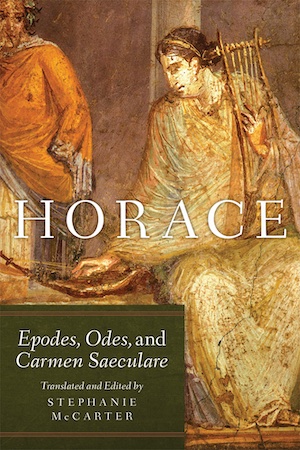By Louis J. Kern
Quintilian, Roman rhetorician, declared Horace (65-8 BCE) “of the lyric poets . . . nearly the only one who deserves to be read . . . varied in his expression and most excellently bold in his choice of words” (Instituto Oratoria 10.1.96). Nearly a century later Nietzsche concurred, finding in Horace “all that is Roman and . . . noble par excellence,” rendering “all the rest of poetry . . . in contrast, something too popular—mere sentimental babble” (Twilight of the Idols,” What I Owe to the Ancients” 1, 1889).
Notoriously difficult to translate because of rhetorical complexity, e.g., callida ihunctura (combination of antithetical ideas to create a novel effect), and metrical versatility (the first nine “Parade Odes,” each in a different meter), McCarter has produced a modern bilingual text presenting the poems in iambic meter. The translation is enhanced by extensive historical, linguistic, and stylistic notes, and an essential “Glossary of Rhetorical and Literary Terms.”
Horace bridged classical Greek and Augustan Roman culture, bringing Aeolic, lyric poetry into Latin rhythms, popularizing Stoic and Epicurean philosophies, and adapting Greek mythology to Roman literature. He coined the terms carpe diem (Epicurean, Ode 1.11), auream quisquis mediocritatem (“golden mean” (Stoic, Ode 2.10) and, less felicitously, dolce et decorum est pro patria mori (Ode 3.2). Though erotic elements evinced elegiac tradition (Propertius’ Cynthia Monobibles), Horace’s primary focus was ethical—a simple life and reciprocating friendship as keys to equanimity. He Latinized the Greek ideals of paideia (socialization synthesizing poetry, philosophy, history, and action) and ataraxia (self-control, emotional mastery, inner peace). Eschewing politics and public life, he found a patron in Gaius Maecenas, who provided financial support, gifted him a small latifundium in Lucretili, and introduced him to the circle of Augustus, who commissioned him to write the Carmen Seculare celebrating the Secular Games (17 BCE) inaugurating a new saeculum (ca. a century-long period).
Horace embraced Augustus’ moral reformation, grounded in pietas (piety and duty) and the mos maiorum (ancestral mores)—religious renewal, a restrictive sexual/marital code, and pronatalism. He flourished at the end of the Roman civil wars (Pax Romana) and the assumption of imperial power by Augustus as princeps civitatis. A patrician poet, he shared the prejudices of his class and gender—xenophobic fear of barbarians (Ode 1.13 and 1.27), fear of female sexuality (women as witches and man-eaters, Ode 1.27), and ambiguity about rape.
Given his self-declared sexual impotence (hyperbolic?), modern readers may well find his erotic poems fastidious, self-pitying, and insipid. Consideration of his earliest work, Satirae or Sermჾnis (35 BCE) reveals a more colloquial and franker diction. Satire 1.3 asserts “nam fuit ante Helenam cunnus taeterrima belli causa” (“even before Helen’s day, cunts were a dire cause of war”). Eschewing sex with married women, he writes, “tument tibi cum inguinal, num, si amcilla aut verna est praesto puer impetus in quem continuo fiat, malis tentigine rumpi? Non ego: namque parabilem amo venerem facilemque” (“When you’re starving? When your prick swells, then, and a young slave girl or boy’s nearby you could take at that instant, would you rather burst with desire? Not I: I love the sexual pleasure that’s easy to get” (Satire 1.2).
In a world of acute anxiety, identity dysphoria, and insecure ethical values, the current popular revival of interest in Stoicism and Epicureanism (vide dailystoic.com and epicswerve.com), especially among men of status and power, a quest for the ideal of ataraxia provides fertile ground for a renaissance of interest in Horace’s work, and McCarter’s excellent translation in contemporary idiom offers an excellent introduction to the poetic contrast of the two philosophies in the quest for a balanced life.
Louis J. Kern (ΦBK, Clark University) is professor emeritus of history at Hofstra University. Hofstra University is home to the Omega of New York chapter of Phi Beta Kappa.




